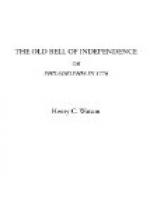“Six companies of a British regiment, under their lieutenant-colonel, being hard pressed by an advancing column, threw themselves into Chew’s house, and, barricading the lower windows, opened a destructive fire from the cellars and upper windows. Our troops, finding their musketry made no impression, were in the act of dragging up their cannon to batter the walls, when a stratagem was attempted, which, however, failed of success. An officer galloped up from the house, and cried out, ’What are you about? You will fire on your own people.’ The artillery opened, but, after fifteen or twenty rounds, the pieces were found to be of too small calibre to make a serious impression, and were withdrawn.
“A most daring attempt was then made to fire the building. Lieutenant-Colonel Laurens, aid-de-camp to the commander-in-chief, with a few volunteers, rushed up to the house under cover of the smoke, and applied a burning brand to the principal door, at the same time exchanging passes with his sword with the enemy on the inside. By almost a miracle, this gallant officer escaped unharmed, although his clothes were repeatedly torn by the enemy’s shot. Another and equally daring attempt was made by Major White, aide-de-camp to General Sullivan, but without as fortunate a result. The major, while in the act of firing one of the cellar windows, was mortally wounded, and died soon after.
“Washington accompanied the leading division under Major-General Sullivan, and cheered his soldiers in their brilliant onset, as they drove the enemy from point to point. Arriving in the vicinity of Chew’s house, the commander-in-chief halted to consult his officers as to the best course to be pursued towards this fortress that had so suddenly and unexpectedly sprung up in the way. The younger officers who were immediately attached to the person of the chief, and among the choicest spirits of the Revolution, including Hamilton, Reed, Pinckney, Laurens, and Lee, were for leaving Chew’s house to itself, or of turning the siege into a blockade, by stationing in its vicinity a body of troops to watch the movements of the garrison, and pressing on with the column in pursuit of the flying enemy. But the sages of the army, at the head of whom was Major-General Knox, repulsed at once the idea of leaving a fortified enemy in the rear, as contrary to the usages of war and the most approved military authorities.
“At this period of the action the fog had become so dense that objects could scarcely be distinguished at a few yards’ distance. We had penetrated the enemy’s camp even to their second line, which was drawn up to receive us about the centre of Germantown. The ammunition of the right wing, including the Maryland brigades, became exhausted, the soldiers holding up their empty cartridge boxes, when their officers called on them to rally and face the enemy. The extended line of operations, which embraced nearly two miles, the unfavorable nature of the ground in the environs




